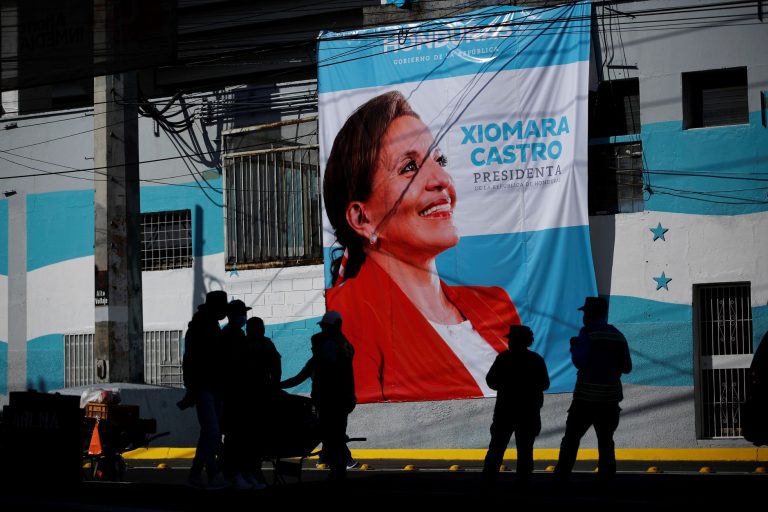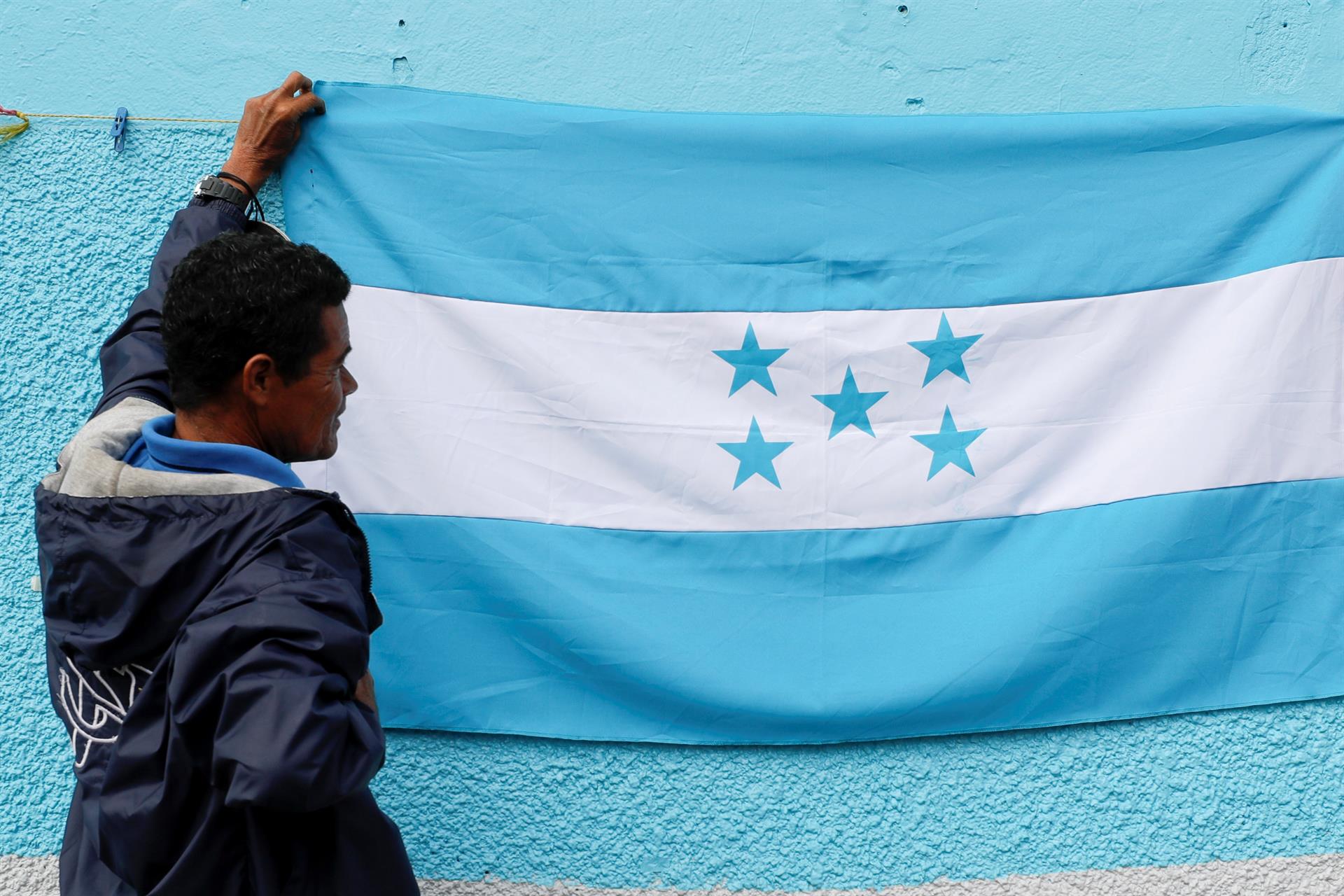Agencia Regional de Noticias (ARN)
11 de mayo 2022
PUBLICIDAD 1M
PUBLICIDAD 4D
PUBLICIDAD 5D
Up until now, the new leader has kept four of the 18 promises that made up her agenda. The most outstanding one was the extradition of outgoing preside

Enero, 2022. Un anuncio con el rostro de Xiomara Castro, presidenta de Honduras, en las calles de Tegucigalpa. // Foto: EFE | Bienvenido Velasco
During her electoral campaign, Xiomara Castro announced 18 promises she’d keep if she became President. A hundred days after she assumed office, four of them have been completely carried out. Honduras’ first female president came to power with an agenda topped by the extradition of her predecessor, the country’s economic situation and the crisis of Honduran migrants.
Honduras faces “a social and economic tragedy”, and the country is “bankrupt”, Castro summarized when she was inaugurated on January 27. Confronting corruption, resolving problems in security, education, and health, and creating more jobs were the promises the new leader spoke of that day.
During these first 100 days, the government agenda was dominated by the extradition to the United States of former Honduran president Juan Orlando Hernandez. Hernandez faces a federal indictment in the New York courts, alleging he received “millions of dollars” from the drug cartels, including that of Joaquin “El Chapo Guzman”. He’s accused of turning Honduras into a “narco state” during his time as president, from 2014 to 2022.
The new president’s bilateral meetings thus far have focused on corruption in the Central American country and on the migrant crisis. Following her inauguration, the brand-new leader met with US Vice President Kamala Harris. Castro emphasized that the fight against corruption and impunity will continue to form the central pillar of her commitment to the country. She agreed to seek the assistance of the United Nations in “establishing an international commission.”
Migration is another key theme in the mutual Honduran-US agenda, Kamala Harris indicated clearly. Following the initial meeting with Harris, Honduran foreign minister Enrique Reina and Defense Minister Jose Manuel Zelaya met with US secretary of State Anthony Blinken, in the context of a meeting on Migration. That topic was again on the table during conversations Castro sustained with Mexican president Andres Manuel Lopez Obrador.
One of the first measures that Xiomara Castro implemented in her plan for the first hundred days was a largescale pardon, in order to reduce overcrowding in the country’s prisons. The Honduran prison system was built with a capacity for 8,000 inmates, but was holding around 22,000, of whom less than half had received their verdicts and sentences.
In addition, in February 2022 the Honduran Supreme Court ordered the liberation of six environmental activists, declared guilty in a trial revolving around conflicts with the Los Pinares iron oxide mine. At her January 27 inauguration, Castro had declared her commitment to free these prisoners, which she now has.
Another measure accomplished was the elimination of the questioned Employment and Development Zones (Zede), approved in 2013 by the government of Porfirio Lobo and promoted by the Hernández administration.“Today is the most important day of my 88 in office. Restoring the country’s sovereignty was an inescapable commitment we had with history,” declared President Castro while signing the decree to abolish these zones.
The Employment and Development Zones were areas where the investors, not the Honduran government, were responsible for the fiscal policies, security, conflict resolution, and other things. The previous government had denominated these autonomous employment zones as “model cities”; however, opponents criticized them as “micro-states” created within the country. According to a report of the National Anticorruption Council, the Zones enjoyed functional and administrative autonomy and allowed the establishment of autonomous and independent tribunals, which could adopt the legal systems of any country in the world.
In terms of the employment problem, the leader also celebrated the repeal of the Law for Hourly Wage Employment, a norm that allowed companies to contract up to 40% of their labor force as temporary workers. The new law established that the 40,000 workers employed under this system can’t be fired at will. For their part, the Honduran Council of Private Enterprise and the legislative bench of the opposing National Party criticized this repeal, arguing it would end up increasing unemployment.
According to data from the National Statistics Institute of Honduras, visible under-employment affects 43% of the Honduran workforce. These are “employees who can’t get work for the number of hours they need, but instead work for several hours, a few weeks, or every other day,” Eugenio Sosa, the Institute’s director, explained to reporters from La Tribuna in April.
“That’s why it’s said that there are over three million Hondurans with employment problems. The statement refers to this data on unstable employment.” Adding to this are the 27% of workers with full time jobs but whose salary doesn’t cover their necessities.
In her inauguration speech, Castro promised to subsidize 100% of the energy consumption of the country’s poorest families. At the beginning of February, the Honduran Parliament approved an initiative that would cover 1 million, 335 thousand people.
This week, the government sent the Honduran Parliament a law that classifies electric service as a public good for the national security, and an economic and social human right.
The establishment of a General Department of Economic Planning and Social Development was one of the campaign promises of President Castro’s Libre Party. The new State agency was inaugurated in April 2022, together with a Department for Women. The new government eliminated 17 other state agencies, programs or projects created under the previous National Party administrations. The Castro government is now composed of 24 departments.
On May 9, a UN mission will arrive in Honduras with the task of studying the viability of installing an International Commission against Impunity (CICH). President Xiomara Castro had requested the creation of such a commission – made up of members of the UN – to help fulfill her campaign promise to fight corruption.

A man extends a Honduran flag outside the National Stadium where Honduran President-elect Xiomara Castro will be inaugurated. Photo: EFE | Confidencial
The new Annual Budget for Honduras was approved by Parliament on April 8, in the sum of just over 14.8 billion dollars. It represents an increase of 16.9% over the 2021 annual budget.
This sum will allow Castro to advance in some of the areas that formed part of her self-proclaimed 18 major tasks. Among them is to increase by 134% the amount allotted to the National Electoral Council. The opposition questioned that sizable increase, alleging that the country isn’t in an electoral year. However, the government argued that the sum will be used to carry out the promised popular consultations.
The opposition bench asserts that it’s part of a plan to hold a National Constitutional Convention, but for now the government insists it will not be promoting this project, since conditions for it are lacking.
The Castro Administration has defended their proposed budget, saying they need to lessen the country’s debt while complying with their commitments in areas of health, education, recovering public companies, the environment, and combatting poverty and corruption.
Before its final approval, the government argued that the hike in the General Budget was needed to confront the debts inherited from previous governments. These, the president stated upon taking power, left the country “bankrupt”.
In an interview with ARN, the Regional News Agency, Rodolfo Pastor, Secretary of the President’s Office, declared they had received the country with “a debt, that represents more than 60% of the Honduran GNP of just over 20 billion dollars.”
“As a result, nearly 50% of the projected budget for this first year will automatically go towards paying that debt, leaving us with a reduced capacity – more accurately, no capacity at all – for public investment,” he added.
In April, the Honduran government asked to be incorporated as a member of the Latin American Development Bank, in order to confront the new government’s economic challenges.
In the request letter to New York, the foreign minister asked for Honduras to become a shareholder in the organization, in order to “have access to diverse and adequate tools and financial instruments”, which, in turn, could allow the “strengthening of institutions, modernization of the State, support for a regulatory framework for investment (…) all cross-referenced for transparency and environmental protection.”
Among promised measures still pending are those linked to tax exemptions, free internet, and a new Penal Code.
This article was originally published in Spanish in Confidencial and translated by Havana Times
PUBLICIDAD 3M
PUBLICIDAD 3D